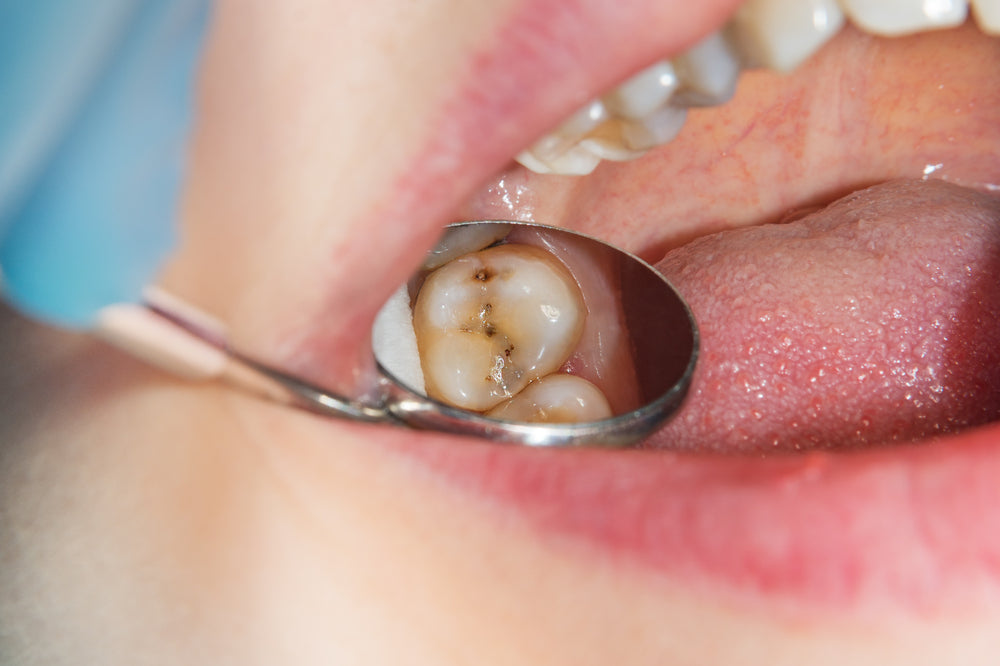
How to Tell If You Have Cavities
|
Time to read 4 min
Published on
|
Time to read 4 min
Today we're going to explore the world of cavities. Cavities, also known as dental caries, are areas of tooth decay that create holes in the teeth. They're often the result of plaque buildup, frequent snacking on sugary foods, and neglecting oral hygiene. Cavities can affect both the outer coating of your tooth (the enamel) and the inner layer (the dentin).
Cavities occur when carbohydrates in food and drinks like soda and sweets linger in the mouth. Bacteria present in the mouth convert these into acids. Along with saliva and food particles, these acids form plaque, which clings to your teeth. This acidic plaque erodes the enamel, leading to cavities.
While a number of factors work to promote cavities, the simple and basic cause of cavities is bacterial. An unhealthy balance of bacteria in your mouth is the basic cause of not only cavities but of most oral disease.
And, although we mostly think of children when we thing of cavities, that is a misconception. Adults are equally at risk, especially with receding gums and gum pockets or old fillings that might break down–leaving holes where bacteria can harbor, leading to decay.
Tooth Sensitivity : This is a common early sign. Sensitivity to temperature changes can indicate a developing cavity.
Pain When Eating or Drinking : If eating hot, cold, or sweet foods causes discomfort, it may be due to a cavity.
Pain from Pressure : Discomfort while biting or pressing on a tooth can be a sign of deeper decay.
Toothache : Persistent pain is a telltale sign of an advanced cavity.
Visible Holes or Pits : Visible indentations on the tooth surface are clear indicators of cavities.
Discoloration : Dark, black, or white spots on teeth can signify decay.
Bad Breath : Persistent bad breath can be associated with cavities and decay.
If you suspect you might have a cavity then the best tactic is to take fast action and see your dentist. The earlier you catch and treat a cavity the easier it is to treat–saving you not just time and money but helping to avoid painful procedures or even a tooth extraction.
Cavities are a common dental problem, but with proper care and regular dental check-ups, they are entirely preventable. We all know that maintaining good oral hygiene, routinely, and visiting your dentist regularly are keys to a healthy smile but that is not all.
The real key to great oral health and doing your utmost to prevent tooth decay and gum disease is to restore and maintain a healthy oral microbiome. Having a healthy balance of bacteria in your mouth does not only promote healthy teeth and gums but it also plays a critical role in feeling good all over.
Effective bad breath remedies include:
Gentle and regular scraping of the tongue
Regular oral care practices such as daily brushing and flossing
Professional deep cleanings and plaque removal
The ongoing use of oral probiotics.
One, the probiotics compete with the existing bad bacteria and reduce their presence by “crowding them out”
Two, the probiotics produce BLIS or “bacteriocin-like-inhibitory-substances” which is a technical way of stating that one probiotic strain (bacteria) can produce a substance that inhibits or kills off other bacteria. Three, by working to control gingivitis, gum disease and tooth decay these probiotics reduce the very sources of bacteria-generated odors in the mouth.
Studies have shown a clear reduction in plaque levels and gingivitis symptoms when oral probiotics were administered to patients with moderate to severe gingivitis.